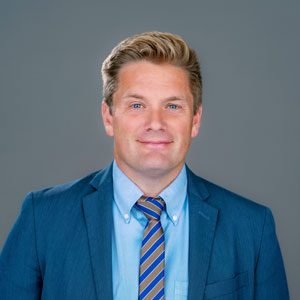SDSU Researcher Reveals Healthcare Workers’ Feelings of Stigma and Isolation During the Pandemic
In spite of “healthcare heroes” label in public, healthcare workers at the forefront of COVID-19 were subject to negative emotions at home and on the job.
During the COVID-19 pandemic, healthcare providers were often publicly celebrated for their work in treating the sick and helping to contain the virus.
 Open the image full screen.
Open the image full screen.
However, San Diego State University management professor, Devin Rapp, demonstrated how these same workers — while celebrated as “heroes” by society at large — felt privately stigmatized and ostracized by those whom they had close contact, including members of their own families “for their perceived risk of contagion.”
“The work of individuals working in healthcare, waste management and the military is necessary to keep society running,” said Rapp. “However, we often attempt to keep those occupations and the dirty work they do for us at a comfortable distance.”
Rapp’s paper, “Dirty Heroes? Healthcare Workers’ Experience of Mixed Social Evaluations during the Pandemic” (with coauthors J. Matthew Hughey and Glen Kreiner), was published by the Academy of Management Journal earlier this year., The research included a survey of healthcare workers (such as administrators, physicians, nurses, etc.) about their experiences and mindset as they remained on-the-job during the COVID-19 lockdown.
“At the outset of the study, we were trying to understand the impact of the concept of ‘healthcare heroes’ on those workers,” said Rapp. “We expected — perhaps naively — that healthcare workers were experiencing greater professional pride and engagement. However, we quickly learned that the participants in our study experienced widespread avoidance from their family and community based on stigmatization and fear.”
Rapp also found that many of the workers also rejected the notion of being called “heroes” as they faced negative reactions and ostracization (“you’re a hero, but don’t get near me”), leading to the term “dirty heroes.” The concept of the term “dirty heroes” was further bolstered by interviews with the healthcare workers themselves, with one nurse reporting that hospital employees referred to the floor reserved for COVID-19 patients as “the dirty floor.”
Conversely, Rapp also found that while there were many individuals who stigmatized healthcare workers, there were others who appreciated and applauded them, with one physician’s assistant reporting that she would hear “thank you for your work” and “a lot of clapping” from “random strangers.”
Despite the outward displays of appreciation, many of the workers also said that the accolades did not lessen their feelings of isolation, leading some to conceal their occupations (such as not wearing scrubs or badges) in public settings. Additionally, some workers reported it was their bosses who made this request, which workers saw as a public relations management tactic as opposed to infection control.
In conclusion, Rapp noted that when healthcare workers reported being subjected to an intense mix of emotions based solely on their occupations, it should send a signal to workplace administrators that stigma management strategies (such as using the term “heroes” in the work setting) which don’t align with an employee’s personal experiences may prove ineffective.
“It is important for managers and decision-makers to be aware of how mixed messages and stigmatization can undercut the positive work environments they are seeking to create,” said Rapp. “Therefore, it is important for management to understand the psychological stress their employees are experiencing in order to build a more supportive workplace culture.”

